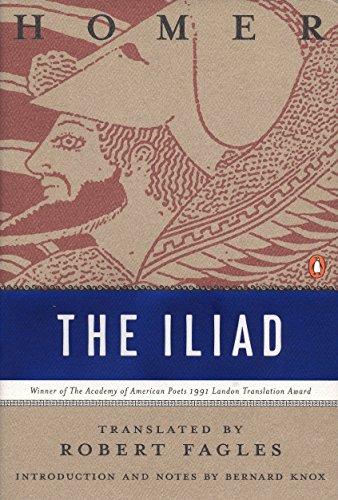Homer, The Iliad (translated by Robert Fagles, ©1990, Penguin 1998)
Book 19 line 162 to Book 21 line 485
For eight months now I’ve started most days reading two pages – roughly 70 lines – of The Iliad. I’m away from home at the end of July, and didn’t bring it with me, but there’s still quite a bit to report.
At the end of last month, Achilles was about to re-enter the battle. This month’s reading began with Hephaestus, god of fire, creating magnificent new armour for him, including a shield whose decorations include images of all aspects of life. Achilles dons the armour and, basically, starts killing people. Zeus lets all the gods of the leash – they’re now free to join in on whichever side they like, and they do. Fleeing Trojans fall into the river, and the river god, enraged at being filled with corpses, rises up and attacks Achilles. But Hephaestus comes to his aid – so it starts to look like Australia in the current phase of climate change: raging floodwaters and relentless fire at war with each other.
There’s a lot more. My key take-away this month is a realisation that the word ‘hero’ has changed meaning quite a bit since Homer’s day. I doubt if anyone took Achilles to be a role model. First he takes offence and brings terrible destruction on his own people by sulking in his tent when they desperately need his help, behaviour that gets him called a beeyatch online these days (Sorry, I couldn’t find the place again to give you a link). Then, once he’s back in the battle he is absolutely, brutally ruthless. He not only sets out to slaughter everything in his path, including the river, but he makes callous, mean-spirited speeches to those he is about to kill. A hero in the sense of role model or exemplar of moral virtue he is not. Achilles as a hero doesn’t inspire admiration so much as terror. ‘Thank the gods this is set in the ancient past,’ I imagine Homer’s first readers muttering, ‘because it would be a nightmare to have someone like that alive today.’
When I went looking for the beeyatch quote, I stumbled on this, from Simone Weil:
The true hero, the true subject, the centre of the lliad is force. Force employed by man, force that enslaves man, force before which man’s flesh shrinks away. In this work, at all times, the human spirit is shown as modified by its relations with force, as swept away, blinded, by the very force it imagined it could handle, as deformed by the weight of the force it submits to.
(from ‘The Iliad, or The Poem of Force’, 1939)
Maybe that’s the point. Achilles isn’t so much a hero, as a person at the mercy his passions, transformed by them into something monstrously destructive.



I can think of any number of current day Achilles-like heroes who are stuffing up our world! Terrific post!
LikeLiked by 1 person
*chuckle* “…it starts to look like Australia in the current phase of climate exchange: raging floodwaters and relentless fire at war with each other.”
Re the word hero: I don’t know anything about ancient Greek, but in Latin, the word ‘vir’ means both man and hero, and ‘virtus, virtutis’ means courage, bravery, strength and power. The Latin word spawned ‘virile’, ‘virility’ etc in English. ‘Vir’ can mean character or virtue but only in the context of manliness. So yes, our idea of hero is different.
I’m only a beginner in Latin but I think the meaning of ‘vir’ lacks any sense of morality, which makes sense in an age where the gods had no sense of morality either. The gods were like men, they did as they pleased according to how they felt at the time, and Zeus who gave in to his anger whenever he felt like it was no role model either.
I read somewhere that the C19th idea of a hero lapsed in WW1 when it made no difference to the outcome how brave an individual soldier was in the age of a mechanised war. All that ultimately mattered was the number of men the opposing sides were willing to sacrifice. IMO the bravery awards that were given mean even more because of that, because those men knew that their individual actions couldn’t change the outcome, but they could help those caught in the same monstrous trap and they could give meaning to an otherwise meaningless struggle.
LikeLiked by 2 people
Bravo your reading and thanks for this post.
LikeLiked by 1 person
Pingback: The Iliad: Progress report 9 | Me fail? I fly!